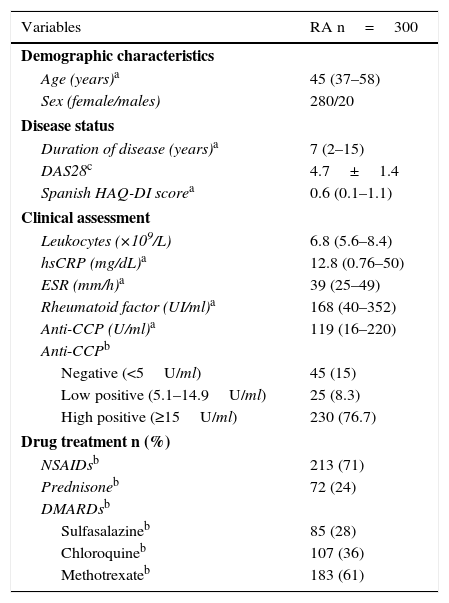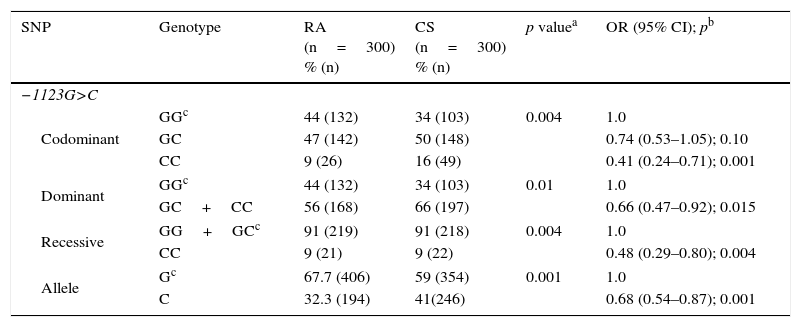The protein tyrosine phosphatase non-receptor type 22 (PTPN22) gene encodes an important negative regulator of T-cell activation, lymphoid-specific phosphatase – Lyp – and has been associated with different autoimmune disorders. The PTPN22 −1123G>C polymorphism appears to affect the transcriptional control of this gene, but to date, the biological significance of this polymorphisms on rheumatoid arthritis (RA) risk remains unknown. We evaluate the association of PTPN22 −1123G>C polymorphism with anti-cyclic citrullinated protein antibodies (anti-CCP) and risk for RA in population from Western Mexico.
Materials and methodsA transversal analytic study, which enrolled 300 RA patients classified according to ACR-EULAR criteria and 300 control subjects (CS) was conducted. The −1123G>C polymorphism was genotyped by PCR-RFLP. The anti-CCP antibodies levels were quantified by ELISA kit.
ResultsWe found a higher prevalence of homozygous PTPN22 −1123CC genotype in CS than in RA patients (OR 0.41; 95% confidence interval 0.24–0.71; p=0.001), suggesting a potential protective effect against RA. Concerning anti-CCP levels, the CC genotype carriers showed the lowest median levels in RA (p<0.05).
ConclusionThe PTPN22 −1123CC genotype is a protector factor to RA in a Mexican-mestizo population and is associated with low anti-CCP antibodies.
El gen de la proteína tirosina fosfatasa no receptora de tipo 22 (PTPN22) codifica la proteína linfoide tirosina fosfatasa – Lyp – un importante regulador negativo de la activación de células T, que se ha asociado a distintos trastornos autoinmunitarios. El polimorfismo −1123G>C en el gen PTPN22 parece afectar al control de la transcripción de este gen, pero hasta la fecha, la importancia biológica sobre su contribución al riesgo de desarrollar artritis reumatoide (AR) sigue siendo desconocida. En el presente estudio evaluamos la asociación del polimorfismo −1123G>C con anti-cyclic citrullinated protein antibodies (anti-CCP, «anticuerpos antipéptido citrulinado cíclico») y el riesgo de desarrollar AR en la población del occidente de México.
Materiales y métodosSe realizó un estudio transversal analítico, en el que participaron 300 pacientes con AR clasificados de acuerdo con los criterios del ACR-EULAR y 300 sujetos control (SC). El polimorfismo −1123G>C se genotipificó mediante PCR-RFLP. Los niveles de anticuerpos anti-CCP fueron cuantificados mediante una prueba de ELISA.
ResultadosEncontramos una mayor prevalencia de genotipos homocigotos CC en SC en comparación con los pacientes con AR (OR 0,41; intervalo de confianza del 95% 0,24–0,71; p=0,001), lo que demuestra un posible efecto protector contra la AR. En cuanto a los niveles de anti-CCP, los portadores del genotipo CC mostraron los niveles más bajos en el grupo de AR (p<0,05).
ConclusiónEl genotipo CC del polimorfismo −1123G>C en el gen PTPN22 es un factor protector para la AR en la población mestiza mexicana y se asocia con niveles bajos de anticuerpos anti-CCP.











